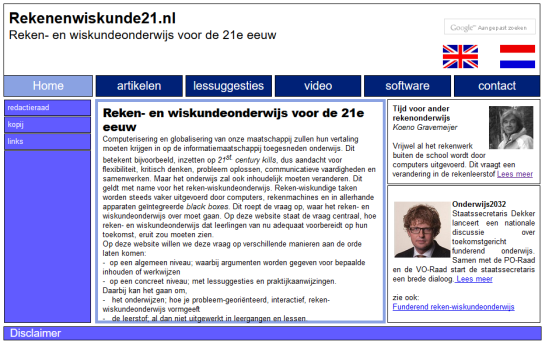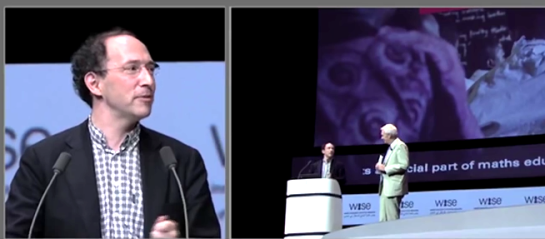Teaching arithmetic in elementary school might be a terrible waste of time. Instead, let kids learn to co-operate, and only later discover with how many other people they can co-operate ? When presidents Obama and Putin could co-operate, then wouldn’t the world be a better place, instead of when each is counting how many warheads and carriers they have ?
Would we dare to make the switch ? We rational people of 2015 embrace evidence based education and we would not easily make such a switch in educational goals and methods. At least, this is official lingo. In reality 2015 is still haunted by ideology. We now have “21st century skills” as the new fashion.
Ideology versus evidence based education
In official lingo it were the 1960s and 1970s during which ideologies ruled supreme. Hans Freudenthal (1905-1990) opposed what he denounced as ‘traditional drilling’ to what he praised as ‘understanding’. Words are so great when you don’t have to do empirical tests. Freudenthal developed what he called “realistic mathematics education” (RME) and he succeeded in bullying Dutch education to adopt his approach. RME ideologists are using the bandwagon of “21st century skills” to sell their stories again.
The advent of the (graphical) calculator seemed to support the argument: the calculator can do the number crunching, you need only understand what you are doing. Ah, life can be so great when you can fool yourself and others with such one-liners.
An important element in the RME strategy is to hijack words. Arithmetic originally means the mastery of some algorithms that are also the basis of algebra. In RME this is relabeled as “mechanistic” and “cyphering”. The hijacked notion of “arithmetic” would be something like being able to do RME. Let us not fall into that trap, and compare proper arithmetic with RME-arithmetic. Yes, crummy arithmetic is also a form of arithmetic. Don’t let this property to be misused to replace the one by the other.
Empirical testing is difficult when you put on blinders
A simple empirical test is that the kids show their understanding by solving sums and let the teacher do the calculations. Let us allow the teacher to use a calculator to avoid embarrassment.
A known test question is: An apple and a walnut cost EUR 1.10. The apple is EUR 1 more expensive than the walnut. What is the price of the walnut ?
What does this question actually test ? RME calls it a “context question”, since a context from real life is used to hide an underlying problem in arithmetic. “Context” however is a RME word. It hides that we are discussing applications of mathematics. The RME view tends to put emphasis on the underlying RME-arithmetic. Some say that it also tests competence in language. My suggestion is that language and arithmetic play a role but that major issues for this question are algebra and the ability of modeling once you can do algebra. Translating the question namely gives:
Solve for price a for the apple and price w for the walnut, using
a + w = 1.10
a – w = 1
Language thus is relevant indeed for translating the words into equations, and arithmetic is relevant indeed for the actual calculations: but the major issue are algebraic. If you don’t use the word “algebra” then you have mis-specified what the problem tests for. Calling it merely a “context” is like throwing a crow-bar at mathematics education.
Perhaps this definition is useful: basic arithmetic uses numbers only, basic algebra uses symbols only, and it depends a bit upon context how cases are called that combine numbers and symbols. Is a + 2 a = 3 a arithmetic or algebra ? It seems okay when a school program classifies this as being part of its course in arithmetic.
Some students solve above question by using numbers only. They try different numbers by guessing and probing. Taking the price of the apple as EUR 1, leaves a price of the walnut as EUR 0.10. This gives a difference of EUR 0.90, which differs from the required EUR 1 by being EUR 0.10 short. The latter might be split, by raising the price guess of the apply by EUR 0.05 and lowering the price guess of the walnut by the same amount.
The latter is just one of the many amazing ways how one can avoid doing algebra. Mankind has been avoiding doing algebra for most of its existence.
Requiring evidence based education without a framework or platform ?
If this simple way of testing had been done in the 1970s then RME could have been killed in the bud. Instead, RME ruled supreme in Holland, and Dutch students from elementary school up to university can hardly do arithmetic.
The Dutch government is trying to make tests on arithmetic mandatory for highschool students, in order to force teachers to start using methods that work. Like perhaps so-called “drilling”.
A problem for teachers is that they hardly have research to guide them. There is neither a framework or platform to settle issues in a scientific manner. In the mean time, the development of proper tests apparently is a disaster as well (news item January 2015).
Any research on mathematics education is being attacked from either of the two sectarian groups that still exist. There are two sectarian groups now in Holland:
- The RME theorists at the Freudenthal Head in the Clouds “Realistic Mathematics” Institute (FHCRMI) who claim that RME theory is fine and that the problem has been implementation.
- The group with informal leader Jan van de Craats (emeritus UvA) who propose to use traditional education “updated with the best elements of RME” (without specifying what those elements are).
Compared to these sectarian groups, my proposal since 2008 has been to create a Simon Stevin Institute, as a framework and platform to discuss research results, and to create evidence based education in mathematics. See the earlier weblog text on the power void in mathematics education. With such a framework the two sectarian groups will disappear since their arguments from ideology will not matter anymore. They can supply hypotheses but their ability to manipulate outcomes will be severely limited.
It is bizarre that the Dutch government called for evidence based education but didn’t establish a framework or platform for this implementation yet. A new initiative is however the creation of a body to supervise the development of the curriculum, see this advice by the council on education, that refers to the “21st century skills”. If this body accepts standards of science, then it would enhance evidence based education.
- It is important to specify the link of RME to “21st century skills”, so that this new body is cleansed from the Freudenthal disaster, and adopts the notion of evidence based education.
- It remains advisable to have separate regulations for fields like mathematics, because there is the eternal confusion as if mathematicians are also knowledgeable about mathematics education.
Research funds for education are now regulated by the NWO / NRO, but this essentially means a paradise for unattached researchers who can do their hobbies. Instead, what is required for evidence based education is the link to actual practice, to develop hypotheses for improvement, perform tests, and embed implementations. Compare to Academic Hospitals. Current departments of education at universities should better transform themselves into that format.
The word “algebra” is missing in Van de Craats (2007) and Hickendorff (2011)
Performance on arithmetic in Dutch elementary schools has been tested by CITO. The Hickendorff (2011) thesis evaluated those test scores. This thesis refers to Van de Craats (2007) in Dutch who criticised RME. The word “algebra” is missing in both. Perhaps some texts might be interpreted as referring to algebra by implication, but this might be too lenient. The word “algebra” is also missing in the presentations for the 2014 conference of KNAW, see Hickendorff (2014) and Van de Craats (2014).
Hickendorff uses outcomes of test questions as the criterion of competence in arithmetic, while the true criterion should also look at how the answer is found. For above test question, we found that an answer might be found by guessing and probing, while the real issue is whether the student has developed adequate understanding and skill in algebra and modeling. Looking at outcomes only is invalid for proper decisions on education. This is like looking whether a horse is pregnant and forgetting about whether the sire is another horse or a donkey. It really matters for the future what the offspring looks like.
A major reason to require mastery of traditional algorithms for arithmetic is that those are required for algebra in secondary education. Merely focusing on outcomes of sums is inadequate.
Hickendorff (2011:233) does not really capture the point that Van de Craats (2007) might not make clear enough. This is an inadequate summary:
“(…) for example Van der Craats (2007) argued that these procedural skills are at the core of mathematics, and should therefore receive much more instruction, drill, and practice, than they receive now.”
A proper summary would have been, but, admittedly, Van de Craats didn’t phrase it so clearly:
“if you don’t test on those algebraic / procedural skills, then you allow for education that will handicap students w.r.t. mathematics for the rest of their lives.” (no quote)
One of the conclusions of the Hickendorff thesis is that RME and traditional methods are almost equally good. Policy makers have been referring to this. But the conclusion is invalid. The two teaching methods cannot be usefully compared by looking at outcomes of sums only.
Hickendorff (2011:232) (eliminating references) tends to advise traditional methods by referring to weak students who are not flexible w.r.t. strategies – which however neglects the argument on algebra for students who might be flexible but who would be given a handicap.
“Another relevant comparison is between the accuracy of traditional and nontraditional strategies. A recurring finding in this thesis was that the traditional algorithm was usually equally accurate in division (… note however that this only held for low and high achievers; for medium achievers the traditional division algorithm was significantly more accurate than non-traditional strategies …) and more accurate in multiplication (…) and in subtraction and addition (…). (…) these patterns raise questions on the desirability of learning/teaching trajectory end-points other than the traditional algorithm. Combined with the pattern emerging from the review in Chapter 1 and international reviews (…) that low mathematics achievers benefit from a more directing instruction, these students in particular may need instruction in one standard procedure to solve a problem. We argue that this standard strategy should preferably be the traditional algorithm.”
PM. The Hickendorff (2011) thesis has more objectives. A key one is to provide a bridge between psychology and psychometrics. I am no expert on any of these, and I find it amazing to read parts of the Borsboom (2006) critique that there are intellectual gaps even in this realm. See the weblog text on A.D. de Groot, and the fear that cognitive psychology has reduced itself to behaviorism again.
Pursuing the question why the word “algebra” went missing
How is it possible that Hickendorff made such a crucial mistake ?
She informs me by email that she is a psychometrician and has no background in mathematics education research (MER). I find it illuminating and fitting for research integrity that one specifies one’s limitations. However, it is problematic to do research on a topic and not do research on it. The thesis is not an abstract exercise with random numbers. The thesis really aspires at conclusions on substance (the title of section 8.1 on page 229), whence the author ought to have looked at the substance.

Blinders (wikipedia)
Observe that Hickendorff is a psychometrician, and thus uses a lot of mathematics. It isn’t rocket science to see the role for algebra, especially when it has been pointed out to you.
In 2009 there was a special edition of Tijdschrift voor Orthopedagogiek — Jrg. 48 (mei 2009) Nr. 5. It is remarkable that Van der Plas, Verhoef and Milikowski are not referred to by Hickendorff (2011):
- Van Putten & Hickendorff, with findings similar to the 2011 thesis, and again no word “algebra”.
- Van de Craats, with findings similar to 2007, and again no word “algebra”.
- Liesbeth van der Plas, with the proper analysis that traditional algorithms are required for later algebra. (Dutch p210: “Om ervoor te zorgen dat wiskundeleraren in de brugklas ook daadwerkelijk kunnen beginnen met algebra, is het van belang dat de basisschool haar leerlingen goed heeft leren rekenen met hele getallen, decimale getallen en breuken.”) (This article is also on her website.)
- Gerard Verhoef, similarly, though only one sentence. (Dutch p223: “Dat heeft overigens het gevolg dat ook de algebra van het voortgezet onderwijs niet in vruchtbare aarde valt. Als je niet met getallen kunt rekenen, dan ook niet met letters (zie de bijdrage van Liesbeth van der Plas elders in dit tijdschrift).”)
- Marisca Milikowski, who advises a series of tests on RME versus traditional methods, so that ideology is replaced by empirics. (Dutch p218: “Niettemin, we zouden het kunnen onderzoeken. Zou dat niet chiquer zijn dan altijd weer die stemmingmakerij?”)
Thus crucial questions for Hickendorff, the thesis advisors W.J. Heiser, C.M. van Putten and N.D. Verhelst, and the thesis reading committee A.A. Beguin, P.A.L. de Boeck, E.H. Kroesbergen and L. Verschaffel, are:
- Did they read Van der Plas, Verhoef and Milikowski ? What were the findings from that reading ? If they were not read, why not ?
- Perhaps a paraphrase: Why are those publications not mentioned in the list of references, and only Van de Craats ? Van de Craats is not necessarily qualified for primary education, while Van der Plas is qualified for the role for algebra for secondary education.
- Why is the word “algebra” missing ? Why is the link between arithmetic and algebra not specified, e.g. for the learning objectives ?
- Why is nothing or perhaps hardly anything done with the proposal by Milikowski ? Was the thinking that the thesis provided the distinguishing tests ? So why don’t RME stop with the ideology ? But why is it not clear that you have to know more about the competence in the traditional algorithms, for later algebra, to make the proper distinction ?
Another question, not unimportant is: I wrote Van de Craats in 2008 that the conventional notation of mixed fractions is crooked. When students are confused then they have every right to be so. (See here and here.) This notation thus cannot be used for testing. Has this played any role in this discussion ? Or has Van de Craats been silent on this ? If the latter is the case, would you agree that he should have mentioned it, since it is obviously relevant ?
And another question: What would these psychometricians think about the proposal by the Onderwijsraad for a permanent body for the curriculum, and the advice (see here) by RME-sectarian Koeno Gravemeijer for “21st century skills” (using arguments taken from RME) ?
Could these psychometricians accept that mathematics education research (MER) (including arithmetic) like the Hickendorff thesis and the other research that they have been doing, requires also a qualification in MER, and that MER requires a new start given the sectarian groups that now exist ?


